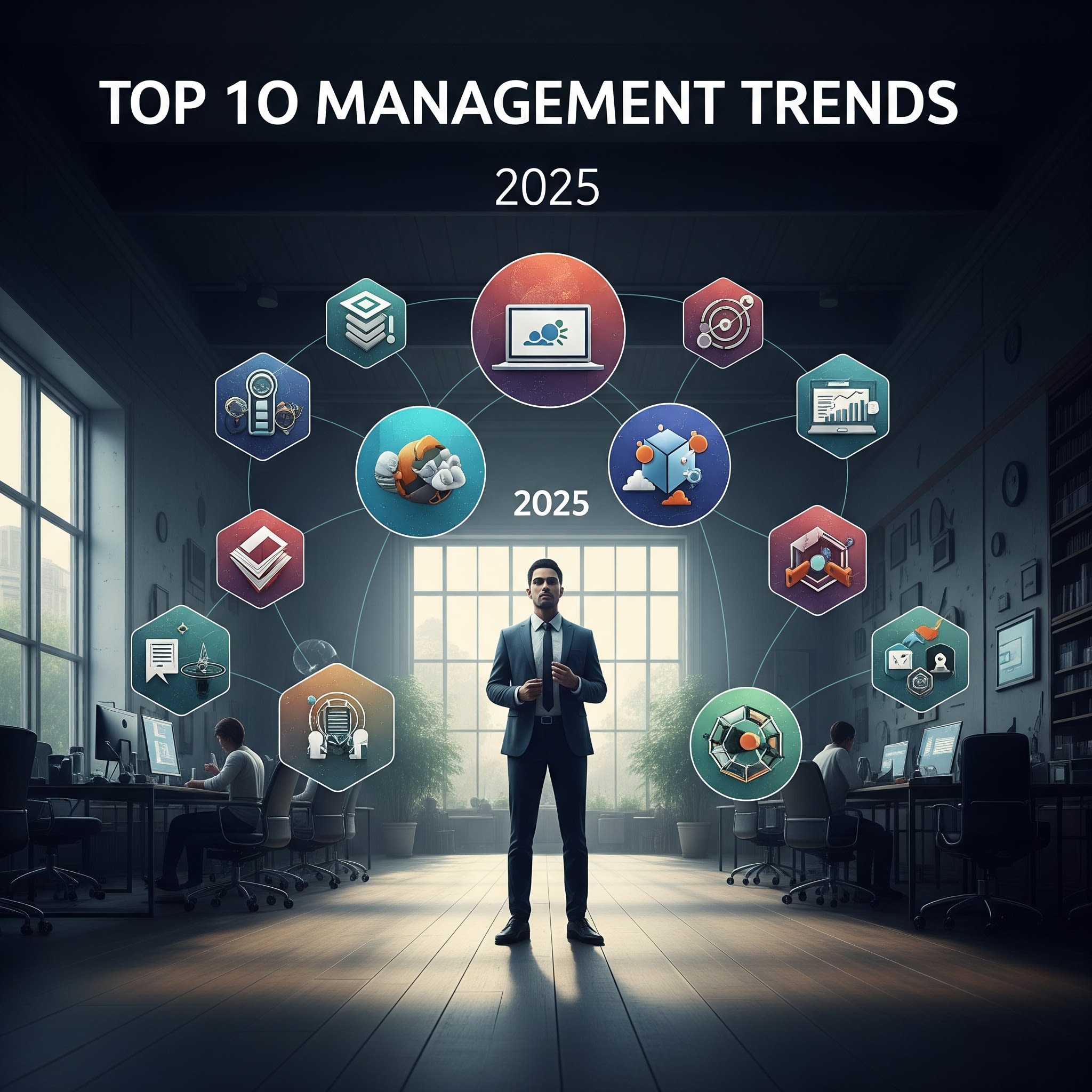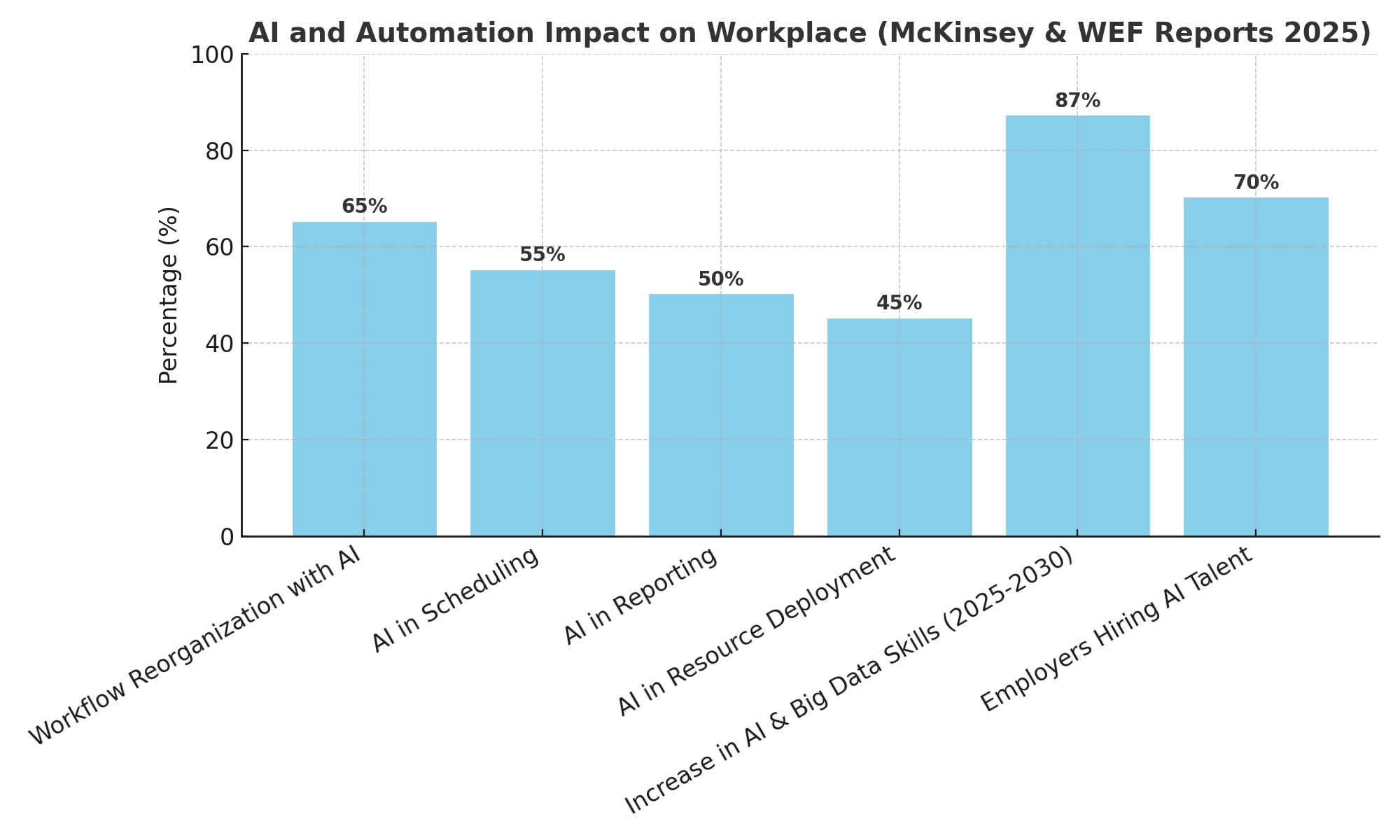Top 10 Current Trends in Management Shaping the Future of Work
Table of Contents

The work world is constantly changing. Throughout 2025, a growing collection of new problems and opportunities is shaping the definition of a successful manager. The way current trends in management are evolving now, and the way we manage now, are no longer about streamlining processes; they are about leading with empathy, employing technology, and being adaptable to a workforce that now requires more flexibility and meaning. This blog post examines the current trends in management that are most important and how they can bring changes to the future of the business.

Top 10 Current Trends in Management in 2025
This article outlines the top ten current trends in management to help shape the future of work:
- AI and Automation in Decision-Making – Integrating AI to improve the way we optimize processes, predictive analytics, and workflow automation.
- Hybrid and Remote Work Models – Developing flexible, collaborative, and digitally-first corporate culture.
- Agility in Operations Management – Use of lean practices and agile principles to build adaptable ways of working.
- Sustainability and ESG Practices – Putting the environment, social, and governance (G) factors front and centre in the way we operate and in our leadership.
- Employee well-being and mental health – Making work-life balance, wellness initiatives, and burnout prevention priorities.
- Data-Driven Management – Using big data, analytics, and dashboards in real-time to make better and faster decisions.
- Inclusive and Transparent Leadership – Ensuring we create diversity and equity for all and have open communication with ALL employees.
- Upskilling and Continuous Learning – Making clear investments in your employees’ professional development, digital skills, and leadership training.
- The Adoption of Digital Collaboration Tools – Derived mainly from project management and channel communication tools (Slack), many ways of working have changed, and have increased productivity.
- Resilient Supply Chain & Risk Management – Building supply chains that are adaptive as opposed to reactive, and strategies for responding to global disruptions.
The Rise of AI and Automation: A Top Current Trend in Management
Artificial Intelligence (AI) and automation have not been buzzwords, and they are transforming the workplace radically. This McKinsey 2025 report on the topic of AI in the workplace states that more organizations are reorganizing workflow to integrate generative AI across everyday business activities, including scheduling, reporting, and resource deployment. In the Future of Jobs Report 2025 published by the World Economic Forum, there was an increase of 87 percent in the intensity of skills related to AI and big data between 2025-2030, with 70 percent of employers aiming to employ talent with such competencies.

This is not a matter of substituting managers. Rather, it is augmentation. AI can take care of simple, routine work, leaving managers to concentrate on direction, innovation, and, above all, the task of the human touch in leadership. The trend highlights the relevance of the skills of critical and creative thinking of a manager that are in the shape of a cognitive performance asset, constantly rising in terms of value in an AI-driven environment.
Hybrid and Remote Work: A Persistent Current Trend in Management
The remote and hybrid workplace model is the new reality in the contemporary work environment due to the increased pace as a result of recent global happenings. Managers have to struggle to ensure productivity, promote collaboration, and establish a good corporate culture for an organization in a decentralized environment. A DHR Global Workforce Trends Report 2025 also revealed that remote and hybrid working populations are also less engaged compared to those in the office, as 41 percent of hybrid workers and 33 percent of remote workers described themselves as extremely engaged, compared with 59 percent of in-person respondents.
Read Also: Best Strategies for Remarkable Sales Management Success in 2025
This new era in management practices points to the requirement of new leadership abilities. Digital communications Managers can no longer miss the mark in this area, as these skills now require the application of various project management tools and team collaboration platforms. They also need to give due emphasis to employee welfare and flexibility, which is now being considered as a significant competitive factor in attracting and retaining talent.
The Evolution of Operations Management: Recent Trends in Operations Management
The upstream of this change is in operations management. Notably, current trends in operations management are determined by technological advances and increased attention to agility and sustainability. As KPMG informs in one of their reports about the Supply Chain trends to learn in 2025, companies are migrating to advanced analytics, AI, and machine learning to streamline supply chains and lower costs.
Some of the main recent trends in operations management are:
Data-Driven Decision-Making: Using predictive analytics software is an essential tool set for operations managers in 2025 since it allows them to imagine market and consumer behavior within the market and operational risk.
Supply chain resiliency: Geopolitical tensions and inflationary pressures are dictating that businesses reconsider their approach to supply chains, towards risk management and developing a more resilient and localized supply chain.
Sustainability and ESG: Environment, Social, and Governance (ESG) standards are not some afterthought anymore. They form the essence of the current trends in management, whereby companies are highly encouraged to enable a circular economy and publish their social and environmental impact.
Read Also: How to Master Customer Experience Management in 2025
Cultivating a Human-Centered Workplace: The Most Important Current Trend in Management
To sum up, in the context of all the technological changes, the most significant present-day management current trends in management revolve around the human factor. The Future of Jobs Report 2025 mentions that the two core skills that employers are in demand are: analytical thinking and resilience, flexibility, and agility. Managers have to change their role from being task-focused bosses to humanistic coaches who help their groups achieve their goals.
This change entails:
Focusing on Employee Well-being: The DHR Global report reveals the following, that 82 percent of employees are experiencing some level of burnout. Managers who pay attention to work-life balance, mental health programs, and a trust-based culture have greater chances to retain talent.
Customized and Employee Development: A Phenom report on Talent Management Trends in 2025 makes a point on the necessity of developing customized employee experiences. Individualization of careers and provision of associated professional growth programs are great ways to improve employee engagement and loyalty.
Transparency and Inclusive Leadership: In 2025, leaders will have to be open, accountable, and dedicated to diversity, equality, and inclusion. This contributes to the creation of psychological safety in the teamwork and development of the feeling of belonging, which is essential in the creation and innovation.
Final Thoughts on Recent Trends in Management
The management landscape is in an immense and thrilling gear change. The latest tendencies in management point to the future of success being not only what you control, but also how you lead. These changes should be navigated by managers who must embrace technology, adopt flexible work plans, and above all, place people first to produce high-performance teams in the future.
Frequently Asked Questions
What are the current trends in management?
Current trends in management focus on digital transformation, data-driven decision-making, remote and hybrid work models, employee well-being, sustainability, and agile project management practices.
Why is it important to follow recent trends in management?
Adapting to recent trends in management helps organizations stay competitive, improve efficiency, and retain top talent while aligning with evolving market demands and customer expectations.
What are some recent trends in management that businesses are adopting?
Some recent trends in management include:
- Artificial Intelligence (AI) integration in decision-making
- Cloud-based collaboration tools
- Diversity, equity, and inclusion (DEI) initiatives
- Sustainability and green management practices
- Flexible leadership styles
How do recent trends in operations management differ from general management trends?
While general management trends focus on leadership, culture, and strategy, recent trends in operations management emphasize process optimization, supply chain resilience, automation, lean practices, and the use of analytics to improve operational efficiency.
What are the recent trends in operations management in 2025?
Key recent trends in operations management include:
- AI-powered process automation
- Supply chain digitization and resilience planning
- Sustainability in production and logistics
- Lean Six Sigma for efficiency improvements
- Predictive analytics for demand forecasting







![Top-Career-Opportunities-After-PhD-in-India-[2025]](https://jaro-website.s3.ap-south-1.amazonaws.com/2025/10/Top-Career-Opportunities-After-PhD-in-India-2025-1024x576.webp)










